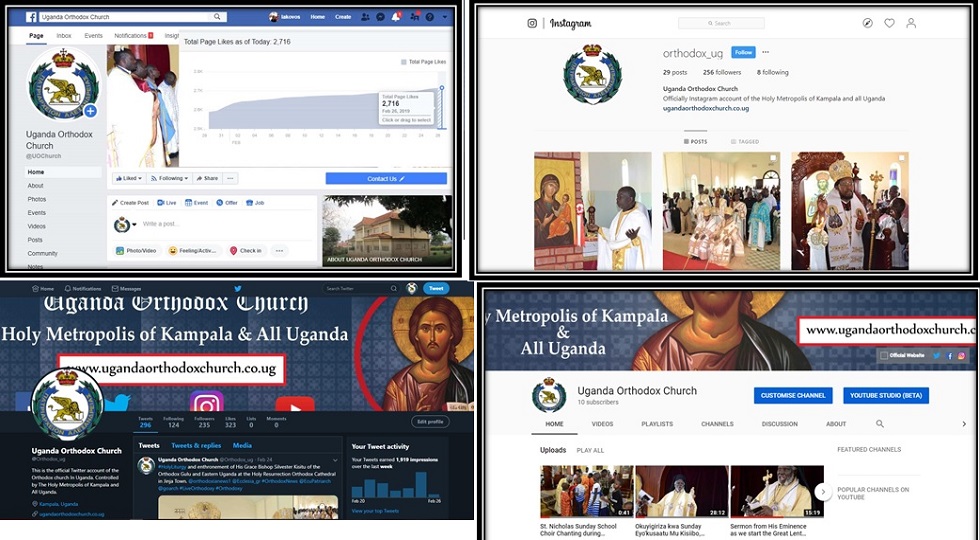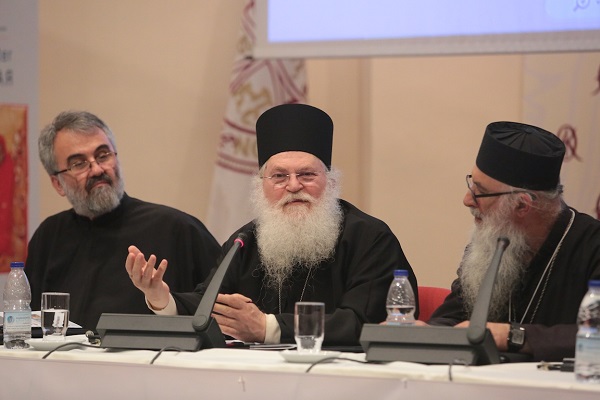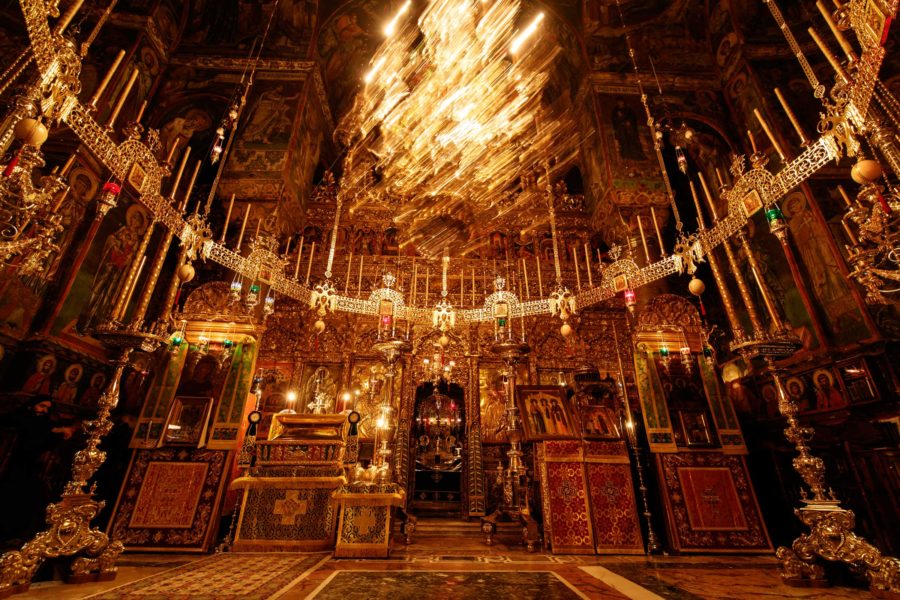19 May 2015
‘Behold, what is so good or so pleasant as for brothers to dwell in the same place?’. It is indeed a blessing from God when siblings meet each other in Christ, in the same place, and have the opportunity to talk, to work together, to communicate and hold conversations about the important subjects which concern Christians today.
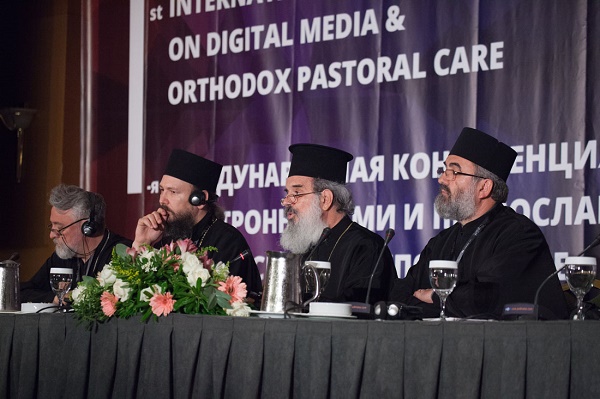
We praise God, worshipped in the Trinity, that we have reached the end of the present conference, because we have managed to carry out a great task: to organize an international conference on the digital media and Orthodox pastoral care, bringing into contact Orthodox Christians from all parts of the world. 72 speakers have taken part in our conference: bishops, hieromonks, priests, deacons, monks, nuns, academics, university professors, legal experts and specialists in Internet use from 21 countries.
As you will readily understand, organizing such a conference was exhausting. On the other hand, however, we have to confess that we miss your physical presence. Nevertheless, we hope that now we are better acquainted with all of you, we can continue our collaboration through the Internet. The foundations for this collaboration have been laid over the past three days, during the course of the papers, discussions, breaks and our participation in the most sublime form of communion, the Divine Liturgy. The heads of Pemptousia, the Orthodox Christian Network and Bogoslov, who formed the initial nucleus of the common effort, believe that the present conference represents a point of departure. We still have a long way to go and we hope to gather more companions along the way.
The proceedings of the conference were held under the auspices of His All-Holiness Bartholomew, the Ecumenical Patriarch and had the blessing of the local metropolitan, His Eminence Pavlos of Glyfada, who embraced our initiative and supported it in a variety of ways.
More than 20 metropolitans and bishops from Greece and abroad took part in the conference. Among these were His Eminence Amfilohios Metropolitan of Kissamos and Selinon, as representative of the Ecumenical Patriarch Bartholomew; His Eminence Ioannis of Thermopylae as representative of His Beatitude Ieronymos, Archbishop of Athens and all Greece; His Grace Grigorios, Bishop of Mesaoria, as representative of His Beatitude Chrysostomos Archbishop of Cyprus; the representative of His Beatitude Archbishop Anastasios of Tirana, Durres and all Albania; and representatives of other Orthodox Churches, as well as a host of clergy and laity.
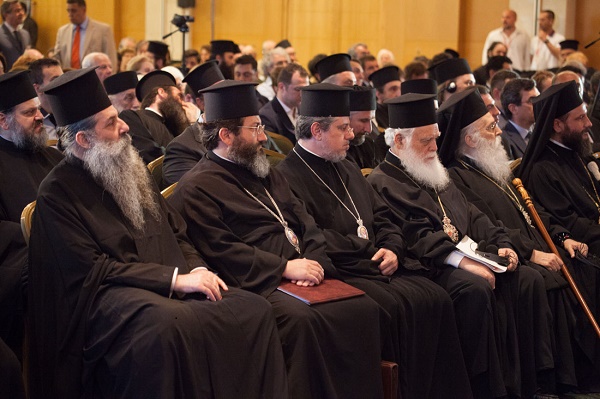
A great many issues were raised at the conference regarding the use of the Internet, which is a great human achievement, a means and a tool for our convenience. This means can certainly be used so that the word of God ‘can make speed and bear fruit’. At the sessions and round table discussions of these three days, note was taken of the problems and dangers created by imprudent use, but, at the same time, the positive side was also emphasized.
In particular, on the one hand mention was made of the negative aspects of abuse, misuse and the unrealistic expectations aroused by even normal use of the modern digital means of communication and information. Also emphasized were the dangers for human persons and their relationship with God and the Church within the reality created by these nascent opportunities. In this scenario, the warnings contained in Patristic writings concerning the consequences of excessive fragmentation of the human persona acquire a new pertinence.
Many speakers made the point that a distinctive feature of our age is the ‘digitalization’ of life – that is the entry of technology in all its manifestations: work, information, education, friendship, interpersonal relationships and elsewhere. All of this changes the ‘identity’ of the person, which now, beyond its actual value, takes on another dimension. There is thus talk of a new kind of anthropology. For example, as small appliance, such as a smart phone, can become an extension and the inseparable companion of a person. Even society has become digital; it appears as a living organism with technical networks as its nervous system.
On the other hand, however, many of those attending highlighted the missionary challenge which has now arisen from the new social circumstances shaped by modern technologies. In other words, they projected the multi-dimensional pastoral duty which the digital coordinates of our lives dictate. In the same spirit, mention was made of the response of the people of God to the initiatives taken locally to bring them into contact with the treasures of Christian spirituality.
So through our encounter here, a great many of our siblings from all over the world, have been given the opportunity to present their digital work, their deliberations, their concerns, their experimentations, their quandaries and their visions. In short, they brought into our fellowship both the sum total of their rich experience and respite through the taste of the fruits of their labours. Ways were presented of utilizing the opportunities for collaboration in digital media regarding the shaping of an authentic Christian conscience, the creation of digital libraries, in order to provide lovers of learning with the incontrovertible sources of Christian tradition, typologies of their audiences and the conclusions drawn from the demands of people today.
Through all of this, indeed, the opportunity was given to participants to become acquainted with another dimension, which has not yet been grasped in its entirety. We mean the relationship between Orthodox monasticism and the Internet, that latter’s adoption into the realm of the ascetic tradition and the suggestions proposed by the monks and nuns for the task of mission and the (re-evangelization) of the world.
Those present were unanimous in their view that any launch into cyberspace could not be undertaken without preparation or under unsuitable circumstances. An appropriate spiritual background is required on the part of the person in charge, as is an elevated sense of pastoral responsibility and, most assuredly, soundness and a Gospel ethos in the presentation of their discourse. Moreover, it should not be forgotten that the Internet is no more than a means and that therefore we ought not to use it indiscriminately, but rather in an ascetic manner, which means we should be imbued with a spirit of mindfulness, restraint and responsibility in our dealings with it. Only then will we emerge from the illusions of virtuality and our activities render tangible and beneficial results in real life.
A number of contributors made particularly valuable suggestions regarding the prospects for developing and coordinating the world of spiritual web-sites. It was proposed that the work of the three-day event we experienced here be continued with other conferences and also that a permanent organ be created which would promote understanding, skills and mutual updating among those responsible for these sites- which, it is worth noting, function by and large on a voluntary basis and are motivated purely by missionary zeal. Another issue raised was the need for an independent agency to endorse those sites which have been recognized by their public as being sound and spiritually constructive.
During the proceedings, we had the pleasure of discussing other related issues, such as the reliability of the provision of information regarding the Church and the need for the transmission of Church services. Besides this, specialists who attended shared their knowledge of specific matters closely related to the uses of the Internet. They touched upon the side-effects, and the threats, of a social, medical, psychological, penal nature, that lurk when we are exposed to cyberspace.
It is certainly true that the Internet has evolved outside the Church, so it was to be expected that some sort of disconcertion would be expressed as regards how it is to be understood and its appropriate use. This, however, is no impediment at all to modern Orthodox thinking, which seeks to exploit the Internet’s potential, to enlist it successfully into the forces of its activities and to sanctify it, as far as this can be managed, for the glory of the Triune God. Three days of intense proceedings have proved this.


